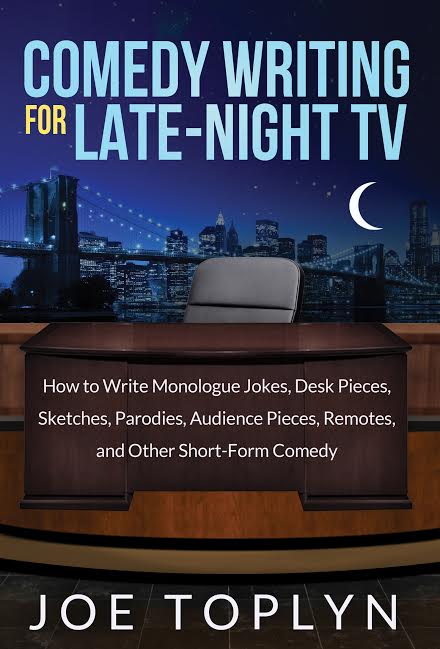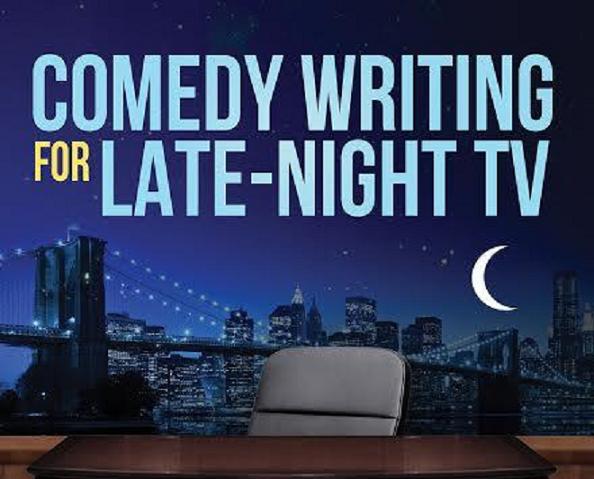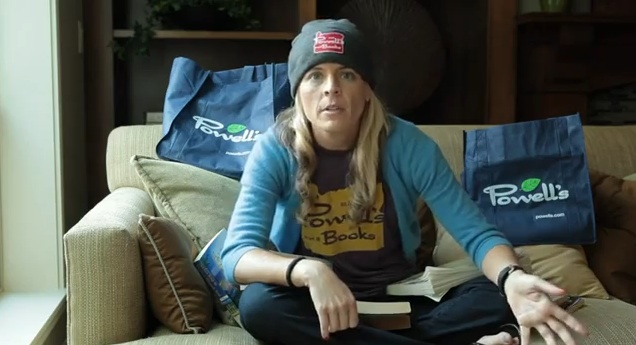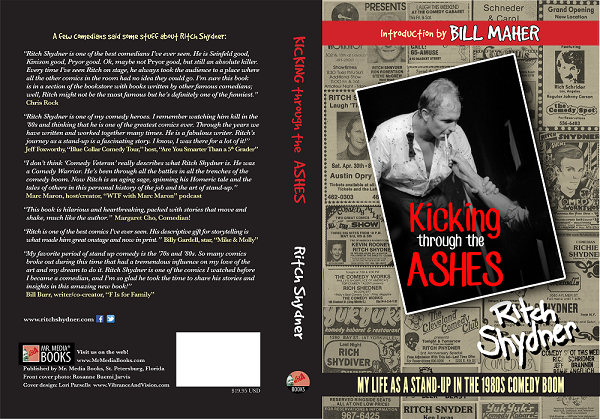Any time is a good time to pick up a book, but summertime sure feels like the right time to lounge poolside or on the beach, or anywhere you feel most comfortable, really, with a great read to pass the carefree day away. On weekends this summer, The Comic’s Comic will showcase an excerpt from a worthy hardcover or paperback in the world of comedy.
This week, it’s “Comedy Writing for Late-Night TV,” by Joe Toplyn.

If you’re looking for one guy to write the book on writing for late-night TV, Toplyn’s your guy. He started his career back at the beginning of Late Night with David Letterman and won four Emmys with Letterman in the 1980s, then wrote for a variety of sitcoms and sketch shows (In Living Color, The Larry Sanders Show, Hanging with Mr. Cooper among them), before taking on the thankless task of head writer for the short-lived Chevy Chase late-night experiment in 1993. Toplyn moved on from that, becoming writer and eventually head writer for The Tonight Show with Jay Leno. He jumped ship in 1995 back to Dave and his Late Show with David Letterman, where also served as head writer for a couple of years. His more recent credits include head writer on The Caroline Rhea Show and writer on Monk.
His late-night TV writing tome gets down to brass tacks: The book’s full title reads, “How to Write Monologue Jokes, Desk Pieces, Sketches, Parodies, Audience Pieces, Remotes, and Other Short-Form Comedy.”
So he know’s what he’s writing about from experience. I’ll get much more out of him soon enough. For now, however, please enjoy this excerpt from chapter five, in which Toplyn dives into detail on the importance of the opening monologue to the late-night TV show.
Monologue Jokes
The most indispensable comedy segment in a late-night comedy/talk show is the host’s Monologue. I can’t think of a late-night comedy/talk show since the days of Steve Allen that didn’t begin with some kind of Monologue. In almost all cases the Monologue is a topical Monologue, a series of unconnected verbal jokes based on the news of the day.
Why Comedy/Talk Shows Are So Topical
Most of the comedy in late-night shows, not just the Monologue, is based on current events. This topicality reduces the value of late-night shows to the companies that own and air them because it gives the shows a relatively short shelf life. The episodes wouldn’t hold up in the ratings if they were rerun years later because the comedy would be too dated to be funny.
Why, then, do comedy/talk shows contain so much topical comedy? There are two main reasons, one emotional and one practical:
The emotional reason: Topical comedy helps make the host relatable to viewers. When you get together with coworkers at lunch or with your family around the dinner table, what do you tend to talk about? What happened since the last time you met, what happened today, what’s happening now, right? That’s why a host who gives you his funny take on the news and helps you make sense of it seems like a friend, relatable. And because you enjoy spending time with your friends, topical comedy helps draw you back to that host’s show night after night.
The practical reason: Basing comedy on current events makes it easier to keep the comedy funny. Late-night shows air new episodes four or five nights a week, week in and week out. That means the writers have to constantly generate new comedy material, up to twenty minutes worth a night. One way to help keep the material fresh, and therefore funny, is to base it on the news because the news is mostly different every day. If a late- night host filled his show with comedy about personal topics like his relatives or about generic topics like airline travel he’d run out of fresh material fast.
Topical comedy is woven throughout every comedy/talk show but it exists in its purest, most concentrated form in the Monologue.
Why Learn How to Write Monologue Jokes?
Some comedy/talk shows have writers on staff who work practically full time on the Monologue. All day long these Monologue specialists absorb vast amounts of news from the Internet, print publications, television, and wherever else they find it and transform it into topical jokes for their shows.
It’s a tough job. Jay Leno performed an unusually long Monologue on TSWJL that consisted of about thirty jokes. To get thirty jokes approved, his writing staff had to submit hundreds. That meant that each of Jay’s Monologue specialists was expected to turn in about twenty to fifty jokes a day. On a good news day—when the news was heavily laden with gleaming nuggets waiting to be refined into comedy gold— one especially prolific Tonight show scribe would write up to a hundred jokes. And the job is even more demanding on a slow news day because the Monologue won’t be getting any shorter. A former writer for Johnny Carson said this about writing a topical Monologue: “Doing this every day is like taking a [dump] when you don’t have to.”
Writing high-quality Monologue jokes in large quantities is so difficult that you may be thinking that the task isn’t for you and, therefore, that you don’t have to know how to do it. Can’t you just learn how to write Desk Pieces and Audience Pieces and all the other kinds of late-night comedy and leave the Monologue writing to the specialists?
No, you can’t. A prospective writer for a comedy/talk show needs to know how to write Monologue jokes. Here are three reasons why:
On some comedy/talk shows every writer is expected to contribute to the Monologue. Some shows have tighter budgets and smaller writing staffs so they can’t afford to dedicate writers exclusively to the Monologue; every writer has to pitch in. In fact, those shows usually request that you include a page of Monologue jokes in your submission packet. That means that writing candidates who demonstrate the ability to write strong Monologue jokes improve their chances of landing a job on those shows.
Monologue-type jokes are the building blocks of many other comedy pieces. That’s because many comedy pieces on comedy/talk shows are “joke baskets”; a joke basket piece gathers together a series of interchangeable jokes under a single topic, such as “Thank You Notes” on LNWJF. And each joke in a joke basket is created using the same techniques you’d use for a Monologue joke. So a late-night writer needs to know how to write Monologue jokes in order to be able to write a lot of the other comedy on the show.
Most of the writing techniques that apply to Monologue jokes also apply to jokes in general. A well-crafted joke is a well-crafted joke, whether it’s on a comedy/talk show or in a newsletter, blog, stand-up act, radio show, sitcom, or feature film comedy. Writers who can create solid Monologue jokes will have an easier time advancing their careers in comedy no matter what direction those careers take.
So pretty much every comedy writer needs to be able to write Monologue jokes. But don’t worry because there’s a formula for it.
From Comedy Writing for Late-Night TV by Joe Toplyn. Reprinted by arrangement with Twenty Lane Media, LLC. Copyright © 2014 by Joe Toplyn.
It’s available now where books are sold:




Currently reading the book. It’s crazy how thorough he is and how much he covers. One of the most valuable comedy books I’ve come across.
Thanks, Ben. Yes, I put in the book any tips and techniques that I thought might be useful. I figured as long as I was going to write the book it might as well be comprehensive.
I also wanted the book to go beyond late-night TV and fill a need that I saw for information on how to write short-form comedy in general.